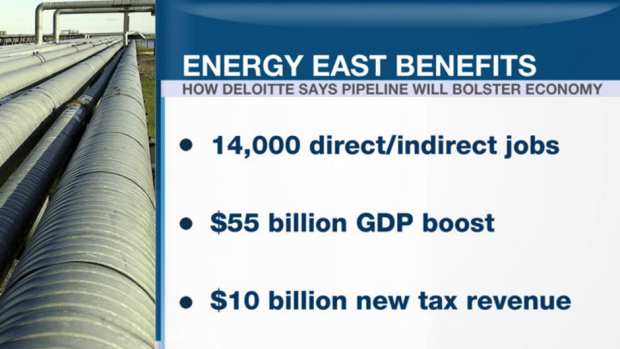Aug 31, 2016
'What a disaster!': Trudeau urged to intervene in Energy East review

Economic benefits from the Energy East pipeline will have to wait until Canadians have an environmental review process they can trust.
As the National Energy Board grapples over how to move forward with its Energy East review amid conflict of interest allegations and violent protests, debate over the controversial proposal has become increasingly polarized. Opponents want the entire review process scrapped along with the $15-billion project, arguing the risk of a major oil spill is simply too high. Supporters, meanwhile, point out that giving Canada’s struggling energy sector a higher-priced outlet for 1.1 million barrels of daily output will help reinvigorate the country’s anemic economic growth.
That argument was bolstered Wednesday morning, when Statistics Canada reported the Canadian economy shrank in the second quarter, with national gross domestic product falling 1.6 per cent from the start of April through the end of June compared to the same period in 2015.

Silence may have been the best strategy for Prime Minister Justin Trudeau several months ago, because opining publicly on a particular project – as his predecessor Stephen Harper had commonly done – would have undermined the NEB’s credibility as a neutral regulatory body. No longer.
As The Globe and Mail editorial board wrote earlier this week, the NEB has a credibility issue it can no longer ignore. Mike Tims, a veteran of Canadian energy finance who helped build Calgary-based investment bank Peters & Co. before retiring as chairman two years ago, believes Trudeau cannot continue playing both sides of the debate with platitudes about the need for a clean environment and a strong economy going “hand in hand.”
“The PM will need to recognize that, at the end of the day, this type of question will be unlikely to ever be resolved in a way that will please everyone,” said Tims, who is now vice-chair fo Matco Investments, in an email to BNN. “At some point, decisions will simply need to be made to go ahead or not.”
Trudeau was likely hoping his decision would not need to be made until late 2018, when the NEB process was originally scheduled to conclude. Yet with that timeline now uncertain as the regulator weighs whether to replace two of the three Energy East review panelists for having met with former Quebec Premier Jean Charest when he was a paid consultant for Energy East backer TransCanada, the need for leadership has come sooner.
“The federal government should have a national energy strategy,” Dennis Mitchell, senior vice-president at Sprott Asset Management, told BNN early Wednesday morning. “The only problem with that is if you’re a Liberal Prime Minister with the last name Trudeau, nobody in western Canada wants you to come up with a national energy strategy,” Mitchell added, referencing the National Energy Program initiated by former Prime Minister Pierre Trudeau in the early 1980s that was widely criticized as unfair to western Canada.
At the very least, Tims argues Trudeau must “first reiterate a fundamental principle: that no democracy can function well if some citizens choose to completely disregard its rules and laws in making their points of view heard.”
“This will almost inevitably mean excluding some people from the hearings, not based on whether they are for or against, but simply based on whether or not they will agree to abide by some procedural rules and let all points of view be heard politely,” Tims said. “It is important not to relent on the principle of civility, while everyone tries to figure out what is best.”
Ottawa had already extended the Energy East review process by nine months in January to include an additional consultation period. The goal was to appease those skeptical of the NEB’s objectivity by adding an extra layer of public scrutiny to the process.
Now that public trust in the NEB has been eroded even further through this latest incident, Raymond James senior oil and gas analyst Chris Cox summed up his view of the process with just three words: “What a disaster!”
Those on both sides of the pipeline debate would likely agree the review process has indeed become a disaster. Ottawa, however, seems content on allowing the arms-length regulator to take a leadership role on cleaning it up.
“It’s in everyone’s interest these hearings get back on the rails as soon as possible,” Natural Resources Minister Jim Carr told BNN on Tuesday. “And it’s the NEB’s responsibility to make sure that happens.”





